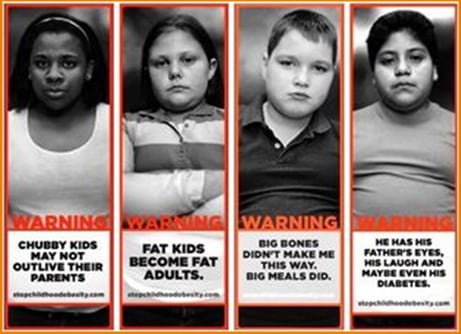
We haven’t talked about the childhood obesity billboards. For a while there, everybody else in the world was talking about them, so Childhood Obesity News decided to wait a bit until the dust settled.
When an issue is controversial, it’s generally true that all sides believe they are acting in the best interests of America’s children. Few people take a stand like, “I hope all the fat kids explode.” Most people want to see improvement on the childhood obesity front. Activists have the best intentions in the world. They agree on the “what.” The “how” is where problems arise.
Alison Flowers of WRBL News 3 interviewed the Ron Frieson, the person responsible for the anti-obesity campaign billboards in the state of Georgia. His organization is the Georgia Children’s Health Alliance, and he designed a three-stage ad campaign, starting with the billboards, which are meant to stimulate awareness and discussion. And, boy howdy, they surely have done that!
Critics believe that the billboards are emotionally damaging for young people. The reporter quotes Frieson on the subject:
These kids’ self-esteem is already impacted by the fact that they’re overweight. Our studies show that the kids want the straight talk. They want to understand what the issue is, and that’s the message that we’re actually delivering to those kids…
Hold that thought, and consider for a moment Dr. Pretlow’s paper, “Addiction to Highly Pleasurable Food as a Cause of the Childhood Obesity Epidemic: A Qualitative Internet Study.” (Incidentally, Childhood Obesity News is gratified to know that this article was helpful to the work of German researcher Adrian Meule, who is also very interested in food addiction.)
Now, Dr. Pretlow’s qualitative study of overweight-to-obese children was made possible by the cooperation of thousands of children and teenagers. A lot of the information was gathered via the Weigh2Rock website. But, for a long time, the website used to be called Blubberbusters. For public relations reasons, in order to avoid giving offense, the name was changed.
Here’s the point: Legions of obese kids poured their heart like never before, in posts to a site called Blubberbusters. And here’s an idea. It might be possible that Ron Frieson could be right about the billboards. Maybe kids take pride in straight talk. Maybe they derive a useful amount of self-esteem from facing up to the blubber.
WRBL News 3 took a poll, and 81 people (presumably grownups) voted on the question, “What do you think about the Stop Childhood Obesity billboards?” By percentile, the results were:
They are offensive and wrongly target children – 37%
They are the wake-up call parents need – 56%
They don’t strike me either way – 7%
Not long afterward, Lynne Murray published a piece called “Painting a Target on Fat Kids,” which examines the idea that to be anti-childhood obesity is to be anti-obese children. She begins by collecting the salient points made by the National Association to Advance Fat Acceptance (NAAFA), which demanded immediate removal of the billboards.
Murray summarizes the NAAFA position:
Ironically ‘health’ oriented initiatives that target fat children co-exist with the Safe Schools Improvement Act (SSIA), an anti-bullying measure, which does not include any mention of physical attributes (such as fat, thin, tall, or short) among the characteristics of children it would protect from bullying.
NAAFA followed this up only a few days later by urging the inclusion of weight and height in the SSIA. The group published a list of facts about bullying, such as the finding by Yale University that “Bullying victims are between 2 to 9 times more likely to consider suicide than non-victims.” And, of course, the stark:
Multiple studies indicate that fat children are the group being most bullied.
Murray also mentions the opinions of Daily Beast writer Paul Campos, who does not even acknowledge the existence of the childhood obesity epidemic. Neither does he approve of the war on childhood obesity, as conducted by Michelle Obama. Campos is quoted:
The first lady would, no doubt, be horrified by the suggestion that her Let’s Move campaign, which is dedicated to trying to create an America without any fat kids, is itself a particularly invidious form of bullying. But practically speaking, that’s exactly what it is. The campaign is in effect arguing that the way to stop the bullying of fat kids is to get rid of fat kids…
Whether we agree or disagree with that, it’s hard to argue with another one of Campos’s thoughts:
Remarkably, debates about whether the government ought to have a role in making American children thinner almost never acknowledge that we have no idea how to do this.
Your responses and feedback are welcome!
Source: “Chairman behind childhood obesity billboards talks,” www2.wrbl.com, 02/22/11
Source: “Painting a Target on Fat Kids,” Body Impolitic, 04/20/11
Image by Georgia Children’s Health Alliance, used under Fair Use: Reporting.

 FAQs and Media Requests:
FAQs and Media Requests: 











